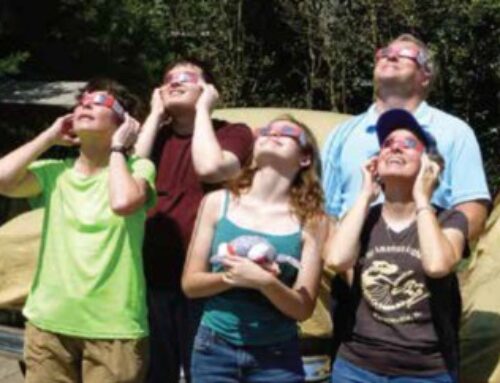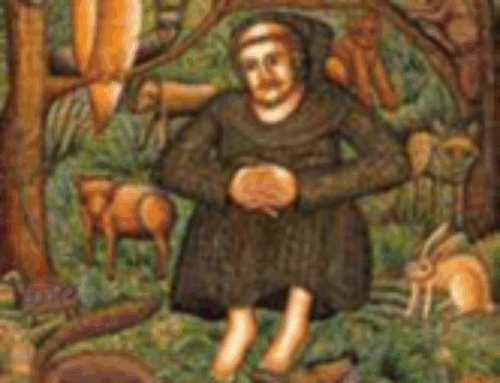(This article originally appeared in the TAU-USA Spring 2022 Issue #105)
By SHARON WINZELER, OFS

Donna Hollis, OFS, with Central American refugee family
Donna Hollis, OFS, is the 2021 recipient of the National Justice, Peace and Integrity of Creation (JPIC) Award presented at the National Chapter. She is a member of the Our Lady of Guadalupe Fraternity in Las Cruces, NM, and serves as a councilor on the National Executive Council.
Carolyn Townes, OFS, JPIC animator, introduced Hollis as a Franciscan living out her call.
“She is on the margins, at the border, taking care of those who have nowhere to lay their heads at night,” Townes said. “She does not judge or question why – only, what can I do to help? How can I love you and care for you – one human being to another? One child of God to another child of God.”
Hollis explained that her work is inspired by Leviticus 19:34, which reminds us to welcome everyone. “You shall treat the alien who resides with you no differently than the natives born among you; you shall love the alien as yourself.”
She works with Project Oak Tree created in 2014 by the Catholic Diocese of Las Cruces to provide hospitality to refugees, who were released from custody to El Paso and the surrounding area to transition to life in the United States. The organization is staffed by volunteers helping unite the immigrants with their families living in the U.S.
The name of the organization is inspired by a passage from Chapter 18 of Genesis, where the Lord appeared to Abraham by the Oak of Mamre; and when Abraham spotted travelers approaching, he offered them food and rest. Later he realized he had been visited by messengers or angels of God.
Within a year, the work at Project Oak Tree surged when refugees began fleeing violence and extreme poverty in Central America and other Latin American countries.
“We, At Holy Cross Retreat Center are just one of the ‘In between places,’ giving them food, clothing, medical care, covid tests, vaccines from the medical team, planning transportation to their families in the US,” Hollis said.
The need has only grown.
“The U.S. government has reported encountering an unprecedented number of migrants at the southwest border. In New Mexico alone there have been 98,409 Border Patrol encounters with people entering the U.S. illegally since October 2020. This count includes unaccompanied children, some of whom are dropped over the wall, pushed through an opening or abandoned somewhere along the international line. Although it is hard to believe, their parents are just trying to save their lives,” Hollis said.
The reasons behind the migration are complex, but the fear that the people have is real.
“People from countries neighboring the U.S. are facing violence, poverty and corruption in the governments that cannot help them. In short, they and their families are not safe,” Hollis said.
Neither is their journey secure.
“From the very moment that a migrant decides to leave home and take off north, all the way until they reach their destination, the threat of death is present on the journey,” she said.
One example was a teenage boy who was found murdered and his body mutilated because he was unable to pay a Mexican gang the ‘crossing fee’ they charged to get into the U.S.
Another was a Mexican woman captured by a border patrol agent.
“She was handcuffed with three others, struggling as she was being forced through a barbed wire fence. The woman slipped her hand from the handcuff and ran. After about 50 feet, she fell from a 20-foot cliff in the dark- ness, smashing her head and dying near the river’s edge,” Hollis said.
She cited statistics from the International Organization for Migration that said 2,191 persons have died along the U.S.-Mexico border since 2014. She added that the U.S. Border Patrol reports that 8,050 migrant deaths occurred along the Southwest border since 1998.
The journey remains incomplete once they reach the U.S. border where they may be sent back to Mexico to await their immigration hearing instead of being released to their sponsors. This is a result of the Migrant Protection Protocol. The MPP requires people who have asked for asylum to return to Mexico to prevent them from spreading Covid in the U.S. It means that the refugees are at risk of further violence and lack access to proper food, shelter and medical treatment, Hollis said.
“Others are detained and live in ‘congregate settings’ that migrants are typically held in. These settings are not set up for social distancing, nor designed to care for people in normal times, let along emergencies. Even those who have demonstrated through a credible fear interview that they merit a U.S. immigration hearing may have to wait for their hearing in Mexico,” she said.
The crisis is compounded by the Afghanistan refugees who were airlifted out of their country to the U.S. after the Taliban took over. Nearly 10,000 Afghan refugees were housed at Ft. Bliss Dona Ana County Range Complex, not far from Las Crucis.
“The relocation of Afghan families into communities across the U.S. creates an opportunity for each of us to stand up and assist people in need. The transition away from the emergency response to the more quality of life response is ongoing. The refugee site may close in the spring once resettlement operations are complete,” Hollis said.
Another 4,000 Afghans resided at Holloman Air Force Base. These were vulnerable contractors and their families who worked with the U.S. during the war in Afghanistan over the past 20 years. They, too, have moved on to resettlement.
“We see the face of Christ in the faces of the refugees. The Divine seed is in everyone. We just have to recognize it. Hopefully, they see God’s love through us,” Hollis said.
Hollis closed her presentation with a reminder of the Gospel’s call to do God’s work among the vulnerable and marginalized.
“So, what do I do with Justice and Peace? I live it out with many, many others who help and support those most vulnerable. We have many Secular Franciscans living out this call to help migrants and refugees in their area of the state. Fraternities seek ways to help and explore ways to be involved with the needs of their areas, including soup kitchens, homeless, the elderly, writing letters to our congressmen and more. We are just being present and much more. We are all living it out.”
“Jesus is telling us where to find Him and where to find God: in the stranger,” Hollis concluded.
“For I was hungry and you gave me food, I was thirsty and you gave me drink. I was a stranger and you welcomed me, naked and you clothed me. I was ill and you comforted me, in prison and you came to visit me. I assure you, as often as you did it for the least among you, you did it for me.”
— Matthew 25:35-40




Leave A Comment